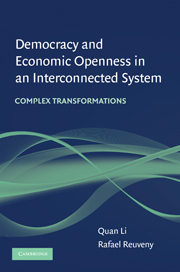Book contents
- Frontmatter
- Contents
- List of Figures and Tables
- Acknowledgments
- 1 Introduction
- PART I THE DEMOCRACY–ECONOMY NEXUS
- 2 Democracy and Economic Openness
- 3 Democracy, Economic Openness, and Income Inequality
- 4 Democracy and Development
- PART II BRINGING IN CONFLICT
- PART III BRINGING IN THE ENVIRONMENT
- References
- Author Index
- Subject Index
4 - Democracy and Development
Published online by Cambridge University Press: 05 June 2012
- Frontmatter
- Contents
- List of Figures and Tables
- Acknowledgments
- 1 Introduction
- PART I THE DEMOCRACY–ECONOMY NEXUS
- 2 Democracy and Economic Openness
- 3 Democracy, Economic Openness, and Income Inequality
- 4 Democracy and Development
- PART II BRINGING IN CONFLICT
- PART III BRINGING IN THE ENVIRONMENT
- References
- Author Index
- Subject Index
Summary
INTRODUCTION
The effect of democracy on economic development has captivated many thinkers. De Tocqueville (1835) and Schumpeter (1942), for example, believe democracy provides the social securities required for development. Hayek (1944) argues that democracies exhibit relatively less unrest and political instability, promoting development. Friedman (1962) asserts that democracy promotes development by keeping state power in check. North (1990) expects autocrats to prey on their subjects, and Olson (1993) argues that autocrats are corrupt and promote their cronies, which are bad for development. Going a step further, Fukuyama (1992) argues that capitalism and democracy work in unison to promote welfare, a view many observers share (e.g., The Economist, 1994; Cohen, 2007).
In contrast, Marx (1867, 1871) and Lenin (1911) argued that democracy came out of capitalist development as a tool for the elite to deprive and appease the masses. John S. Mill (1860), a supporter of democracy, is skeptical about its ability to promote development. Huntington (1968) argues that democracies exhibit high state expenditures in response to their citizens' demands, reducing the excess that is expendable for development. Olson (1982) argues that special interests in democracy shape public policy to promote their own interests, undermining the economy. Wade (1996) argues that strong autocrats can resist popular pressure for policies to save doomed industries, which is good for development. Barro (2000) and Bueno de Mesquita and Downs (2005) argue that autocrats can effectively pursue prodevelopment policies.
- Type
- Chapter
- Information
- Democracy and Economic Openness in an Interconnected SystemComplex transformations, pp. 89 - 122Publisher: Cambridge University PressPrint publication year: 2009

